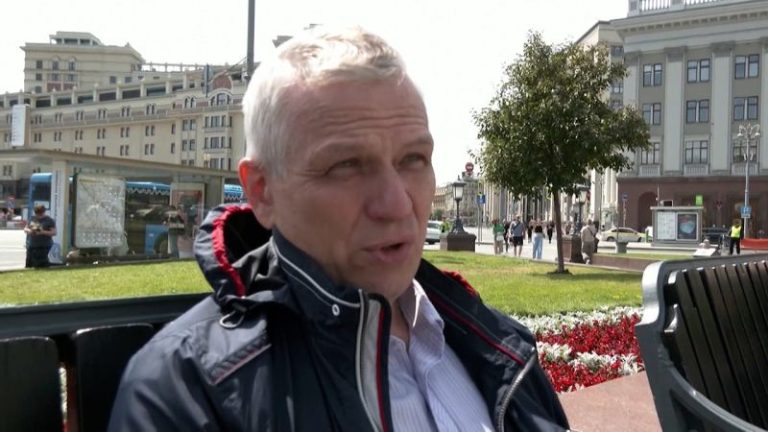Some Russians greeted the weekend’s armed insurrection led by the head of the Wagner paramilitary group, Yevgeny Prigozhin, with sympathy, appearing to welcome the mercenary fighters.
In the southern Russian city Rostov-on-Don, which was briefly occupied by Wagner troops, videos showed residents cheering them on, taking pictures with fighters, and flagging down Prigozhin’s car just to shake his hand.
Videos circulating online also showed crowds in Rostov-on-Don applauding and chanting “Wagner is strength!” and “You are the best!”
Prigozhin’s so-called “march of justice” – which stopped short of capital city Moscow – was harshly condemned by the Kremlin on Saturday, with a furious President Vladimir Putin vowing to punish those “on a path to treason.”
But least one Rostov-on-Don resident seemed curious why they did not go further.
“What kind of demands are you making to the authorities? Why are you not doing it in Moscow? Why did you not go to Moscow?” the resident asks in another social media video.
“I always admired you, always. I always admired how you fought,” the resident added.
Locals were also seen booing police cars that arrived as the Wagner fighters vacated Rostov-on-Don on Saturday, in an abrupt de-escalation.
One civilian could be heard shouting “traitors” as the police convoy arrived, a video posted to social media showed.
“There are very serious problems in the country, and they need to be solved. People who can no longer tolerate it, they come to such radical methods as Prigozhin,” Rostov resident Dmitry said to Reuters.
Further north, in Moscow, there was a sense of relief as the anticipated confrontation was called off. Over the weekend, checkpoints had been set up on Moscow’s outskirts, and residents braced for Wagner fighters to enter.
“It was really uneasy yesterday,” Moscow resident Andrey told Reuters, “But look now, people are walking in the streets and it’s all good. Let’s hope it will stay peaceful.”
Some Moscow residents signaled that Prigozhin’s tirades against the conduct of Russia’s campaign in Ukraine struck a chord.
“I think it was an expression of an opinion,” Oleg, another resident of Moscow, said. “An opinion of a powerful person who wants some justice and clarity.”
The belief Prigozhin should be listened to is widely shared here.
But that sentiment runs counter to the messaging from the Kremlin, which has painted Prigozhin and his Wagner fighters as traitors to Russia.
Throughout the weekend, anchors on state television repeatedly decried Prigozhin’s “betrayal” of his country. “What happened is a real stab in the back for all of us, which still needs to be comprehended,” television anchor Irada Zeynalova said on Russia’s NTV channel.
The uprising seemed to defuse as the Kremlin announced that Prigozhin had agreed to leave Russia for Belarus, and that his troops would register with the Russian military, in a deal that it said was brokered by Belarusian President Alexander Lukashenko.
But the details of Prigozhin’s fate remain unclear.
Images from Rostov-on-Don suggested that the town had returned to normal on Sunday, with people sweeping up rubbish that remained on the quiet streets.
Putin himself hasn’t appeared in public since Saturday, when he made his pledge to punish those responsible for what he called an “armed mutiny” – the biggest challenge to his authority in 23 years of power.
But now that a challenge has been made, there are growing concerns about what it may unleash, and what a defensive President Putin – stung by the events of the weekend – may do next to stay in power.

